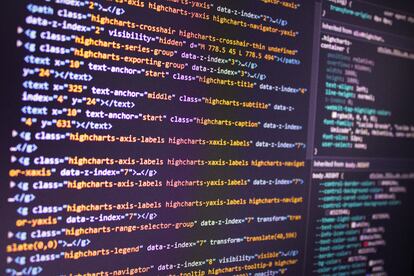Data viewed in UNSPLASH programming language.
Admittedly, while the Weimar Republic fell apart, the world danced;
that we live misfortunes, anguishes and joys always in the same way;
and that history repeats itself because we think of it with the same brain misfortune after misfortune.
But this time it is different.
Legislators write laws altering the amendment of an incomprehensible article of a tax law by additional provisions to a rule on the guarantee mark of organic yogurt.
And our life becomes more expensive and complicated in a subtle, but forceful way.
No one organizes a revolution against an additional provision.
Nobody takes the Bastille because the cashiers no longer help you put the purchase in the bags, nor because there are none and they continue to charge you the same while you do your job.
And the cashiers will disappear.
No one will mourn the cashiers who didn't help you fill your bags.
They have to look for more precarious jobs, even submerged, where they can only afford Chinese mobile phones with the Android operating system and its free applications, which pay with their data while the big technology companies learn from their behavior.
WhatsApp reads her soul and Twitter and Facebook submerge her in a box full of biases and darkness where all the rage that overwhelms her for not being able to rent an apartment for herself, have a decent job or be able to prevent her dirty boss from I groped her in the warehouse.
Her precariousness generates that of others and her fury is amplified until she feels important and accompanied.
The journalists who are paid with necklace bills to cover the conflict in Ukraine or the messengers who pedal bicycles from the city hall to bring you a hamburger that rainy afternoon of sofa, blanket, and Netflix movie, or those who write the subtitles of the movie you see.
They are precarious because of them, because they cannot pay for the news, or go to the movies, and they live on the charity of the technology companies that charge for it in the pound of flesh of each one of us: their data, the data of all, aggregated and structured, destroy businesses and create others that only sustain themselves on precariousness, in an eternal return of infernal circular precariousness.
And, thus, free online services have a radical impact on the trivialization, disappearance and transformation into precariousness of businesses and the certain risk of violation or reduction to the nominal of fundamental rights and social democracy.
It is precisely the change from a productive economy — in which there is an exchange between those who offer and those who buy — for a data economy, which places us on the launching ramp of precariousness and how it becomes a circle of concatenated causes and effects.
Following Bauman and his description of liquid modernity, we find ourselves with increasingly individualistic individuals who do not control their lives, who do not know what will become of them, who do not have a horizon of certainty that allows them to make decisions that help to evolve, and, therefore, psychologically and morally affect individuals who selfishly and somewhat childishly compensate themselves with highly sophisticated services that are remunerated without money, but with their data.
It is worth pointing out at this point how these individuals have been trained in panoptical social control systems and, therefore, consider that non-invasive and invisible surveillance is not such.
These individuals make precarious those services that they consume and that are only sustainable with false self-employed or with workers with very poor working conditions.
In turn, due to this circular effect, they are made precarious by others with whom they share the same misfortune.
In this context, companies are not spared.
To face technology companies that, thanks to the data provided by themselves or by their clients and workers, are more efficient in providing their services, they have to transform digitally.
This is a process that is rarely successful beyond incorporating technology and, above all, lowering the wage bill to compete.
These companies carry a huge legacy that is impossible for them to overcome.
In addition, they have managers — more concerned with surviving and getting the bonus — for whom digital transformation is more of a Power Point mantra than an achievable goal.
To digitally transform, most businesses have to incur high costs to compensate workers and rework processes and technologies from scratch;
simply to do what a technology does with a lower starting cost by not having to redo what was done.
This means that either you cannibalize the business itself or you are replaced by a technology that is native and has enormous intelligence on the behavior of the business, customers, workers and suppliers.
As in the grandmother's monologue from the
Years and Years
series , it's all our fault, and I would say it's all the fault of a system that submerges us in warm water that warms us until we die without being able to rebel.
Of gurus who blame us for our failure because we have not desired success with enough faith, of elites who can lead a fluid life while the rest of the humans can hardly afford to leave theirs, clinging to their family, their city and their circumstances while they get worse, while the water heats without remission.
We get hooked — we get hooked — to the soma of the data, of the applications that cradle us while they make us addicted, that turn off our amygdala while we drug ourselves to get out of our existence and try to be someone else.
Prolonged fear makes addicts indifferent.
In this frame of mind, with cannon-and-butter capitalism turned into data and surveillance, humanity faces catastrophic events with increasing indifference, wondering what a single human being can do to face extinction, short of getting high with The Queen of Flow.
Paloma Llaneza González
is a lawyer, essayist and ikebanaka.
She has a degree in Law from the Complutense University and a Diploma in Higher European Studies from the College of Europe in Bruges. She has been practicing as a lawyer, auditor and drafter of standards in Spain, Europe and the USA.
She is the author of 'Datanomics' (Planeta-Deusto) and the novel 'Appetite for Risk' (
Libros.com
)
You can follow
EL PAÍS TECNOLOGÍA
on
and
or sign up here to receive our
weekly newsletter
.








